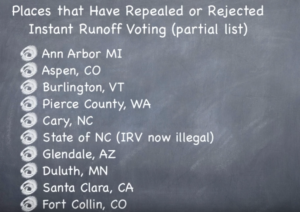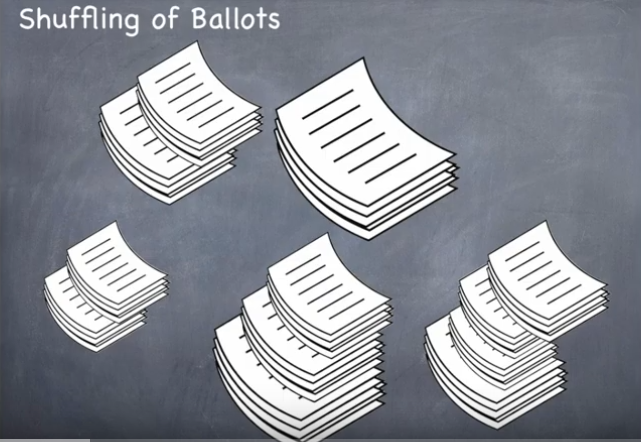by Sue Forde, Guest Editorial
Clallam County, WA Dec. 9, 2020 – At the Board of County Commissioners’ (BOCC) work session to be held on Dec. 14, 2020, commissioners will be presented with a resolution for consideration to promote the idea of Instant Runoff Voting (IRV), otherwise known as “Ranked-Choice Voting.” (See proposed resolution) (see email from Stokan to BOCC)
The Clallam County Home Rule Charter Commission (HRC) is recommending that the BOCC pass a resolution “calling on the state legislature to pass legislation, which would enable the county (and other jurisdictions in the state) to adopt Ranked-Choice Voting for local elections, if they so choose.”
Therese Stokan, HRC Commissioner and sponsor of the proposed resolution, will make a presentation to the Board along with Lisa Ayrault, Director for FairVote Washington, a champion of IRV. IRV is promoted nationally by Fairvote. The Fairvote board includes a representative of George Soros’ Open Society Foundation.
Instant Runoff Voting (IRV) was originally brought to the Home Rule Charter Commission in 2007, where it was placed on the ballot – and was defeated by almost 56% of the voters. Testimony by proponents disclosed that to change our voting machines and system to an Instant Runoff Voting (IRV) system would be very expensive to the taxpayers. It is also a complicated system.
And, as you’ll see below, it effectively removes the “one man, one vote” premise upon which our nation was founded.
The HRC Commission voted in favor of forwarding the proposed resolution in a vote of 10-4 with one absent at their meeting held on Oct. 22, 2020. Commissioners voting in favor were: Jim Stoffer, Tony Corrado, Sue Erzen, Candace Pratt, Mary Doherty, Patti Morris, Nina Richards, Norma Turner, Theresa Stokan and Andrew May; Commissioners who voted in opposition were: David Lotzgesell, Ron Cameron, Joseph Murray and Rod Fleck. A vote was not received from Don Corson.
 Stokan points to State law changing in favor of a “Top Two” primary system. Before that happened, however, there was another Home Rule Charter County – Pierce County, WA – which actually passed an amendment to use IRV as their voting system. After only two years, they repealed it. There are other cities and counties across the nation that have tried using the IRV system, and a number of them have repealed it, as well. (See video “Memphis County Instant Runoff Voting” below.)
Stokan points to State law changing in favor of a “Top Two” primary system. Before that happened, however, there was another Home Rule Charter County – Pierce County, WA – which actually passed an amendment to use IRV as their voting system. After only two years, they repealed it. There are other cities and counties across the nation that have tried using the IRV system, and a number of them have repealed it, as well. (See video “Memphis County Instant Runoff Voting” below.)
Here’s more information about the Pierce County WA issue: https://www.yes2repeal.org/pierce-county-wa
A Pierce County newspaper’s editorial board’s statement issues a warning: “”Look back to the 2006 charter review cycle for an example of a commission taking a wrong turn. Ranked-choice voice was the next cool election idea, winning the support of the commission, the voters and this newspaper’s editorial board. But instead of being as “easy as 1-2-3,” RCV caused rampant confusion and was repealed a few years later. It would behoove this year’s review panel to remember that mistake.”
Stokan points to the Washington State League of Women Voters (LWV) as endorsing alternative voting systems including IRV. The national League of Women Voters (LWV), however, in their promotion of the idea, also point out a number of flaws in the system, including;
-
-
- The ballots and the counting of the ballots will be more expensive;
- The “vetting” is less clear;
- You could still fail to get a candidate with a majority; and
- it may be complicated to determine who will be allowed on the ballot.
-
What is IRV?
According to Wikipedia, Instant-runoff voting is a type of ranked preferential voting counting method used in single-seat elections with more than two candidates. Instead of indicating support for only one candidate, voters in IRV elections can rank the candidates in order of preference.
In other words if there are 5 candidates running for one position, the voter ranks them in order of their preference, 1 through 5. There is only one election involved, rather than a primary and a general election.
In order to determine the winner, according to http://instantrunoff.com/instant-runoff-home/the-basics/
-
-
- Instant runoff voting uses ranked choice ballots to simulate a traditional runoff in a single round of voting. Voters rank candidates in order of preference. They typically are given the option to rank as many or as few candidates as they wish. Indicating support for a lesser choice never counts your higher choices.
- Every voter has one vote. That vote is counted initially for a voter’s first choice.
- If there are more than two candidates who receive votes, the last-place candidate with the fewest votes is eliminated. More than one candidate can be eliminated simultaneously if their combined vote is less than the total of any other remaining candidate.
- Ballots counting for the eliminated candidate are added to the totals of the candidate ranked next on each ballot.
- This process of eliminating last-place candidates and adding ballots cast for those candidates to the totals of the next-ranked choice on that ballot continues until two candidates remain.
-
The candidate with the majority of votes in this final round is declared the winner.
For a good explanation, view the short videos below.
Instant Runoff Voting – False Majorities – Is IRV a Fairvote? Watch the video below – which includes Pierce County WA – also a Home Rule Charter County, and how they decided after using the IRV, to repeal it.
Is Instant Runoff Voting Fair? (AKA Alternative Vote – AV) (Video below) Instant Runoff Voting allows some voters a second vote. Is the IRV winner proportional to the representative support of the voters?
Memphis Council Instant Runoff Voting Example(Video below) More votes can make you LOSE!)
Let Your Voice Be Heard
Be sure to let your county commissioners know what you think about passing the Resolution – and also consider:
If we are so concerned about elections, shouldn’t we (1) first be sure the voter rolls are cleared up every 30 days as required by law; (2) Make sure only legal citizens are voting; (3) and perhaps return to regular polling places where identity can be ascertained by photo ID; and (4) get rid of ballot harvesting?
The BOCC work session can be viewed on a live stream at this link:
http://www.clallam.net/features/meetings.html
If you would like to participate in the meeting by phone call 408-419-1715 and join with Meeting ID: 875 561 784.
If you would like to participate via video conference visit www.bluejeans.com and join with Meeting ID: 875 561 784.
Citizens are encouraged to make public comment by phone, video or in writing.
Citizens with comments or questions can be directed to the Clerk at agores@co.clallam.wa.us or 360-417-2256. Here’s the official notice of the work session meeting. (See Notice)
VIDEOS:
Instant Runoff Voting – False Majorities – Is IRV a Fairvote? Watch the video – which includes Pierce County WA – also a Home Rule Charter County, and how they decided after using the IRV, to repeal it.
A good explanation about IRVs:
Is Instant Runoff Voting Fair? (AKA Alternative Vote – AV) Instant Runoff Voting allows some voters a second vote. Is the IRV winner proportional to the representative support of the voters?
Yet another example
(this one includes a list of places that have repealed or rejected IRV as a voting system:
Memphis Council Instant Runoff Voting Example (More votes can make you LOSE!)
Even the League of Women Voters (LWV), which purportedly supports IRV, states:
The ballots and the counting of the ballots will be more expensive – It either requires a computer system, or is labor intensive to count by hand, with risk of errors. But security and integrity of our elections will require having a “paper trail” so that we can do recounts, and know the results are valid.
The “vetting” is less clear – In the U.S., we have very few requirements for what a person must do to run for office and be on a ballot. With primaries, the idea is that there is so much publicity that voters in later primaries, and then in the general election, will have learned the candidates’ weaknesses and be better informed before voting. If there are no primaries, we may need to figure out how to “vet” candidates better, or pass more requirements for candidates to qualify to run.
You could still fail to get a candidate with a majority. If enough voters did not give any votes to their lower choices, then you could fail to get a candidate who ends up with a majority, after all. Australia requires that voters do rank every candidate, even if they really don’t want some of the candidates. (I have not seen that proposed in the U.S.) This might be interpreted as reducing your choice, or forcing you to vote against your conscience.
“I have not seen this discussed yet, but if there are too many choices, without clear front-runners, I am not sure whether the result reflects the voters’ desires as well as it would if there were only, say, five choices. So it may be complicated to determine who will be allowed on the ballot.” – League of Women Voters (LWV).
________________________
Other Information
Fairvote Washington is affiliated with Washington for Equitable Representation whose mission is to “create a civil democracy.” They are in coalition with other state organizations, including the WA League of Women Voters, Washington Environmental Council and others.
Founded by George Soros, the Open Society Foundation is a global organization promoting “democracies” around the world. According to the website, “Every year, the Open Society Foundations give thousands of grants to groups and individuals who promote our values—through a unique network that is guided by local voices and global expertise… The Open Society Foundations are active in more than 120 countries around the world. Our national and regional foundations and thematic programs give thousands of grants every year toward building inclusive and vibrant democracies.”
Our form of government is a Constitutional Republic, not a democracy, although some people use the words interchangeably. It is always important to define the word. (In a republic, an official set of fundamental laws, like the U.S. Constitution and Bill of Rights, prohibits the government from limiting or taking away certain “inalienable” rights of the people, even if that government was freely chosen by a majority of the people. In a pure democracy, the voting majority has almost limitless power over the minority. More here.)


Recent Comments